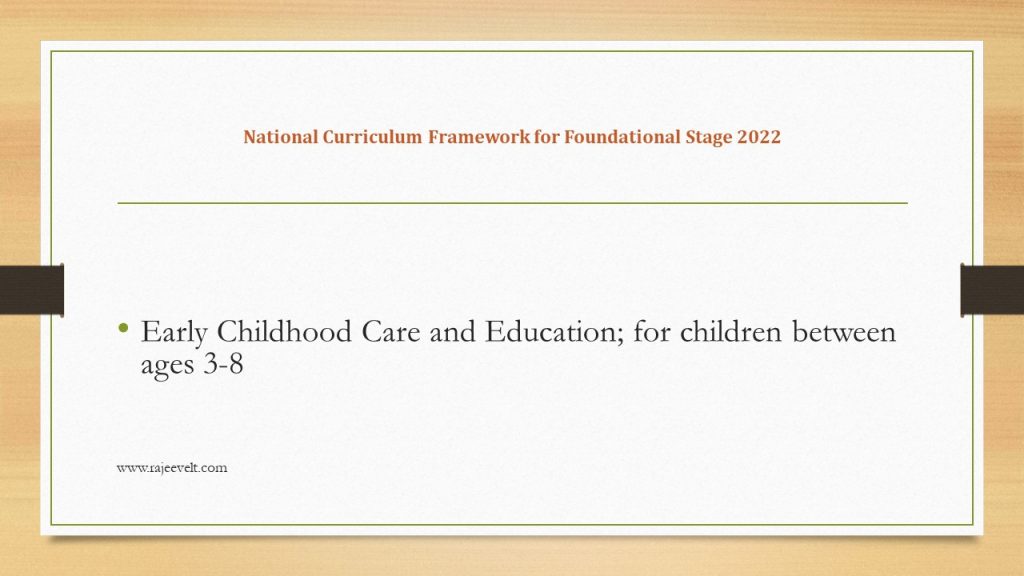Play - of any kind and organized to be free, guided, or structured - can be enabled and facilitated by various methods (e.g., activities, tools, artefacts) that engage children.

Various Learning Tools and Teaching Techniques at Early Childhood Care and Education mentioned in National Curriculum Framework for Foundational Stage 2022
How Children Learns at Foundational Stage
Learning through Play – Art, Craft, Music, Movement
Children express themselves, imagine, and create without any inhibition through the arts. The open-endedness and playful qualities of the arts encourage self-expression, intuition, reasoning, imagination, and communication. Children need to be supported with ideas and opportunities to draw, paint, print, create collages, construct structures with blocks. Children also love moving, dancing, exploring, and improvising with their bodies and playing musical instruments
Learning through Play – Conversations, Poems, Stories
Children enjoy learning through conversations, stories, and poems. This helps them build on their natural sense of curiosity, develop deeper thinking skills and values especially when they are encouraged to reflect, predict, question and hypothesize.
Asking relevant questions or posing riddles or puzzles also helps scaffold children’s learning, challenging them to a new level of understanding.
Listening carefully to what children say, responding meaningfully to their questions, asking them relevant questions to arouse their interest and pushing them to think helps children to learn.
Engaging children through conversations, poems and stories are also a wonderful way to build nurturing relationships with them.

Learning through Play – Material, Toys
Playing with toys is something children enjoy and learn from. Toys can be any concrete object that children can manipulate or use to carry out enjoyable and meaningful play activities that are self-directed or facilitated. There is enough experience and evidence to show that children do not need expensive or specialized toys to learn. For younger children, using toys improves
motor skills and eye-hand coordination, spatial reasoning, cognitive flexibility, language skills, a capacity for creative, divergent thinking, social competence, and engineering skills.
Learning through Play – Using the Immediate Environment
Children are naturally curious and need opportunities to explore, experiment, manipulate, create, and learn about the world around them. Children start exploring their environment through their senses by scanning their environment, touching, holding, and handling whatever they see, listening and responding to sounds, music and rhythm, and getting excited by unusual noises.
Children’s thinking evolves as they construct an understanding of people, objects and real-life situations through first-hand experiences. Children bring their own ideas, interests, and beliefs based on their own experiences and contexts as well as their own abilities.
When Teachers and families provide opportunities to children to explore the world around them, experiment and discover, compare, ask questions, make close observations, think and talk about their observations and predictions, they are being helped to satisfy their curiosities and make more discoveries. Sustaining children’s natural curiosity to explore the world through first-hand experiences at home and in the school lays the foundation for learning.

Learning through Outdoor Play
Children in the early years cannot sit in one place for a long period of time – they need to move around. Playing outside gives them a chance to explore the natural environment, test their physical limits, express themselves and build self-confidence. Most importantly, it helps to build gross motor skills, physical fitness, and balance.
Children enjoy the space, the freedom to run and jump and climb and kick and fall. Playing outside also helps many children to relax and calm down. And it is a lot of fun!
Conclusion
Children at this Stage learn through play which includes a wide range of activities
and stimulating experiences. All these activities and experiences need to be organized in a manner that children remain engaged along with being emotionally and mentally motivated to learn.
Within this broad idea of play, it must be noted that children also learn by observing, doing, listening, reading, speaking, writing, thinking, and practicing. They learn new concepts, interpret them, and connect this newly introduced knowledge with their existing knowledge. Explicit and systematic teaching, some practice and application is necessary especially once children begin literacy and mathematics. However, all of this, must adhere to the basic requirement of children’s positive engagement with strong elements of fun and play.
Resources:-
National Curriculum Framework for Foundational Stage-2022
https://ncert.nic.in/pdf/NCF_for_Foundational_Stage_20_October_2022.pdf


